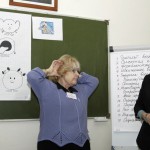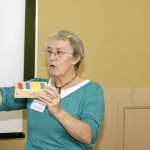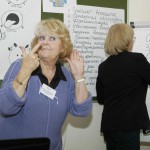18th November 2013
A jump forward
I’m often asked about co-operation between Britain and Belarus – what is happening, any good examples, and so on. Some of the best co-operation is in the voluntary sector.
I recently opened a seminar on autism. The seminar was organised by a British charity, Voluntas, to pass to Belarusian medical experts and Belarusian parents of autistic children, some ideas about how to improve the lives of children with autism. The seminar was the second of two, and part of a project to pass on the expertise learnt in Britain to Belarus.
The support for this project comes from an organisation called the Belarussian Orphanage Project, a small charity based in Wales. They have also funded visits to Britain of doctors, psychologists and those in education to see how autism is tackled in Britain.
Autism is a very complex subject and is not something I knew much about. Having discussed it, I’m struck by how our understanding of the brain is still very limited, despite all scientific advances in the last few decades. Let me try to explain it.
Autism is particularly difficult to diagnose. It is a disorder of neural development – in effect, the nerve cells in the brain don’t connect properly. Although it is present from birth, it doesn’t become apparent until a child is about two years old. As development of senses is impaired, this in turn limits the development of communication skills.
It is also a “spectrum condition” – which means there is a range of severity of the effects, and it affects different children in different ways. What were considered separate conditions especially Asperger syndrome, are now treated as part of the “autism spectrum disorders”.
Unless you have an autistic child, I think it’s hard to understand the problem. It is not visible. As it affects the senses, it is not obvious a child has it until they are old enough to interact with its parents. The signs are the lack of response to stimuli, delays in communication, or the fixation on repetitive actions.
In Britain, recognition of the variety and complicated nature of autism is only relatively recent, helped by such organisations as the National Autistic Society and Autism Initiatives. They lobbied the British parliament and secured the passage of the Autism Act in 2009. This obliged the government to draw up a strategy for support to adults with autism – children tend to be cared for by their families.
Experts believe that 1 in every 100 born in Britain has some sort of autism. This sounds high, but no one can say with any certainty whether it’s increasing or not. Autism was often diagnosed as “infantile schizophrenia”, or “learning difficulties”.
Some individuals have thrived despite their disability – such as the artist Stephen Wiltshire. A leading British writer David Mitchell recently translated the book “The Reason I Jump”, by a 13 year old Japanese boy, Naoki Higashida, who explained why he acted in certain ways. Mark Haddon’s 2003 novel “The Curious Incident of the Dog in the Night-Time” portrayed a boy with less severe autism. The insights from these examples have improved understanding of autism in Britain.
I was delighted to meet the two British women who came to speak to the audience. They explained to me the complexities of dealing with autism, and the improvements in support in Britain. But, despite the wider understanding, they still face obstacles from doctors and other medical professionals.
I also met the Director of the Belarusian partner organisation “Children Autism Parents”. Their aim is the socialisation and integration of people with autism into society, as well as providing assistance to families with autistic relatives.
Through their activities, they have lobbied the Belarusian authorities to improve the services available for people with autism in Belarus. Their contacts with experts from Britain have helped accelerate the process of gaining wider understanding of this “spectrum disorder”.
I was particularly pleased that the seminars were well attended by both parents and health professionals, and in co-operation with the Ministries of Education and Health. It is an excellent example of how social policy can be improved by co-operation across society.
And I hope that the British input can continue to give a jump forward to how autism is dealt with in Belarus.



I thank Hilary Kanaris for the tremendous job done when in Uganda of imparting knowledge skills and values and techniques on how to hundle autistic children
Am realie humbled.
May she be funded back to see and witness the fedback of what she taught us,
May we get other technical training on how to hundle autistic children in uganda since we are very few handling it
May u always keep on equipping us about autism,
Evaristo
Any medications for such people? I will like to read the follow up blogs. Many thanks for this blog. It is an eye opener.
Good afternoon, Bruce!
My name is Anastasia. I’m 18 years old and I’m a sophomore in Belarusian State University. I study tourism. I have learnt about the English club you tend to attend and I would really like to take part there too!
You know, I’m writing song lyrics for about 4 years now. Two of them got to be in annual English books of talented writers. I’m currently writing for Russian and Belarusian artists. I would really like to hear your opinion on my song lyrics. Hope you’ll like them!
It would be amazing if you could be so kind to contact me back.
Thank you a lot.
Best regards,
Anastasia